Search Results
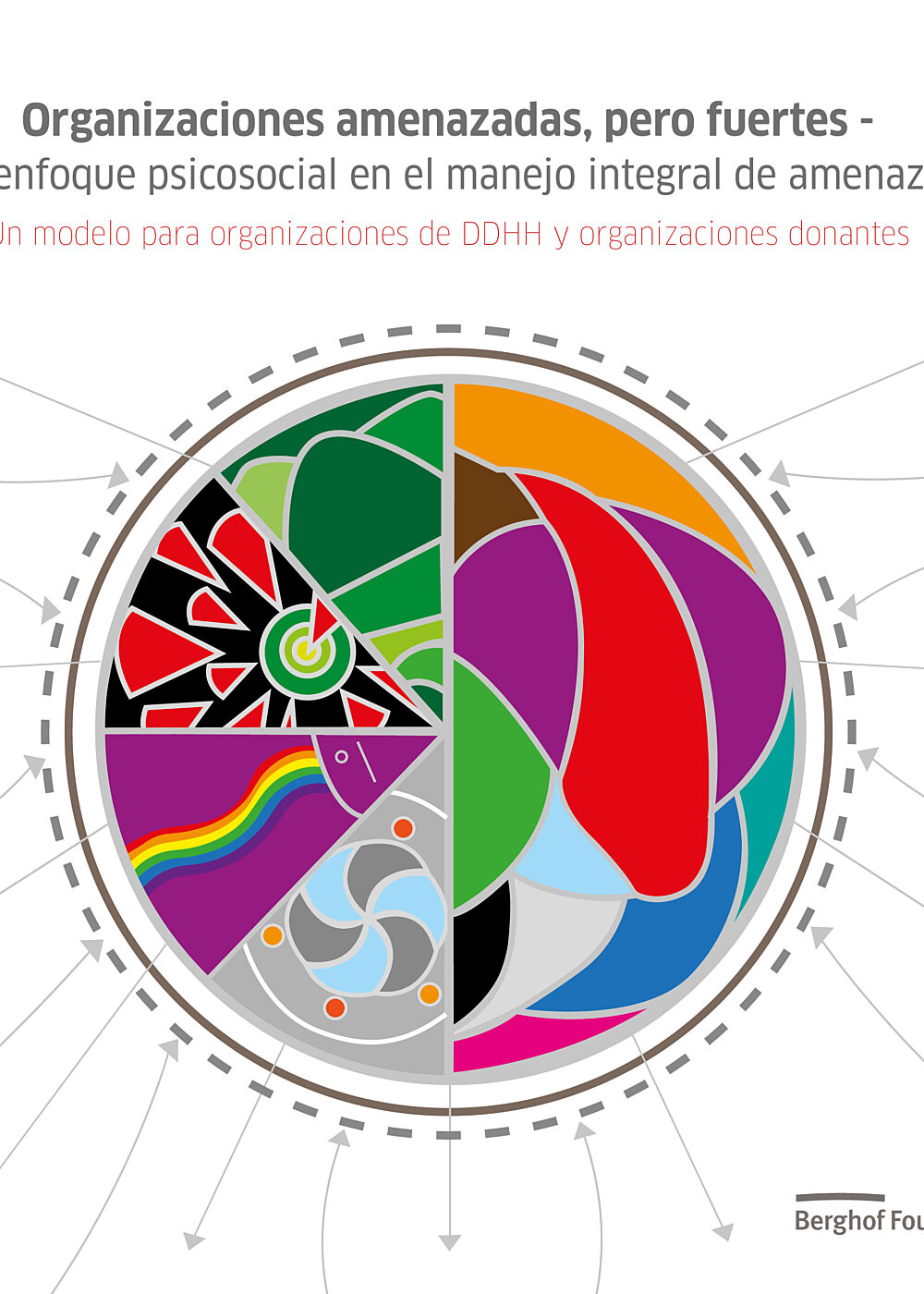
Organizaciones amenazadas, pero fuertes - Un enfoque psicosocial en el manejo integral de amenazasUn modelo para organizaciones de DDHH y organizaciones donantes
Este guía brinda un modelo y detalla recomendaciones para organizaciones de DDHH amenazadas y organizaciones donantes sobre cómo integrar un enfoque psicosocial en las rutinas, espacios y estructuras de sus organizaciones como elemento clave para un manejo intregal de amenazas. Basado en lecciones de un proceso de aprendizaje conjunto dentro del marco del proyecto MAPA hace hincapié en cómo organizaciones DDHH y donantes pueden conjuntamente trabajar hacía esa meta. El guía apoya a iniciar un proceso de cambio y estimula tratar el tema, contribuyendo así a mantener el espacio de actuación para organizaciones de DDHH en contextos de violencia. Entendido como complementario a recursos existentes, la versión interactiva brinda enlaces a otras publicaciones pertinentes.
- Year 2016
- Author(s) Antonia Montanus, Nele Rathke, Barbara Unger
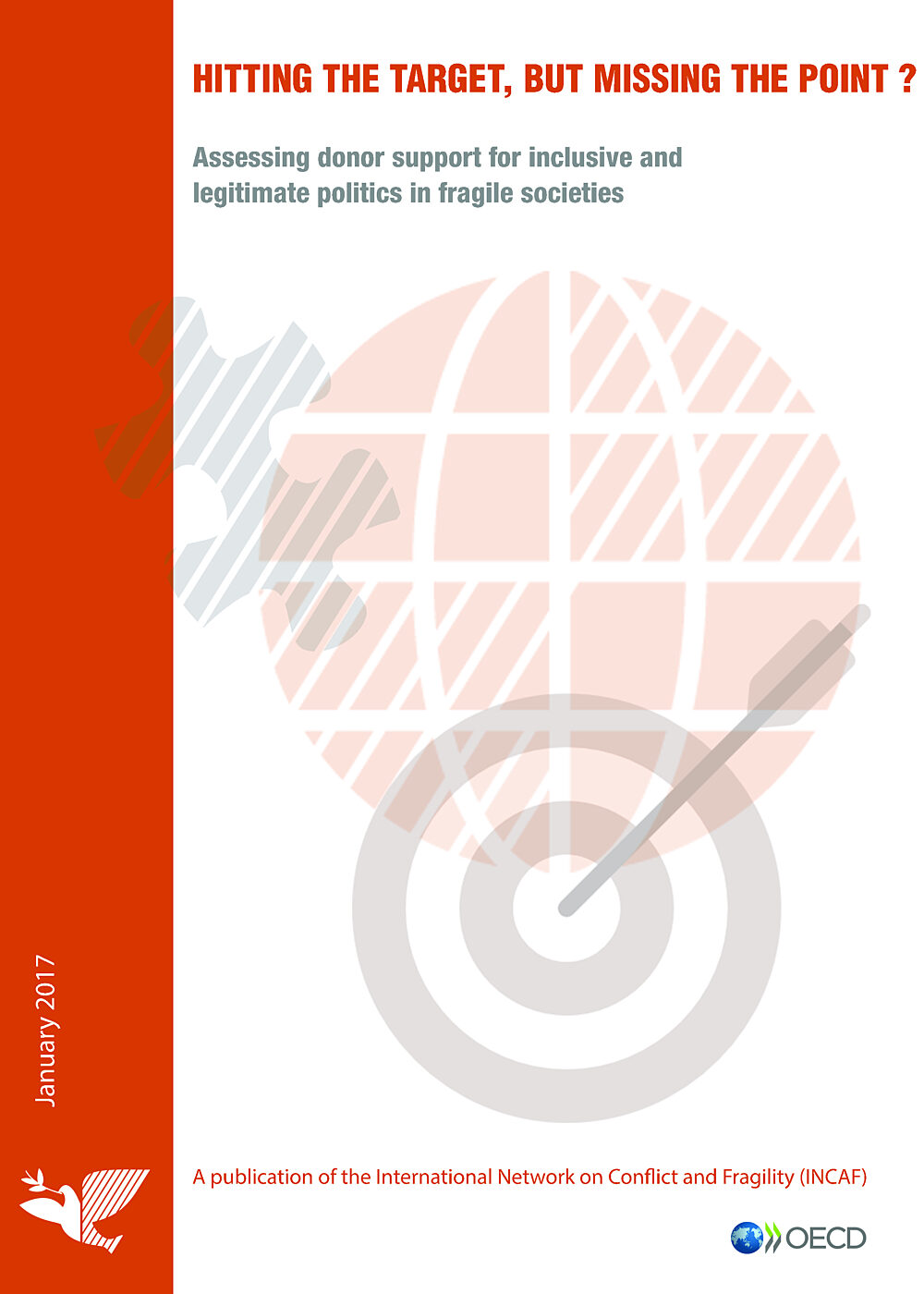
Hitting the target but missing the point?Assessing donor support for inclusive and legitimate politics in fragile societies
The International Dialogue on Peacebuilding and Statebuilding’s ‘New Deal for engagement in Fragile States’ (“New Deal”) of late 2011 promised an end to ‘business as usual’ with regard to development efforts in fragile environments. This report takes stock of the question of how bilateral and multilateral donors have conceptualized and implemented their commitment to promote ‘legitimate and inclusive political settlements and conflict resolution’ (PSG1). On the basis of empirical evidence acquired through case studies in Afghanistan, Somalia, South Sudan and Timor-Leste, the report finds that, at best, donors work with an incomplete and inadequate understanding of the typically fragmented and highly contested politics of fragile societies beyond the formal representatives of their governments and administrations.
- Year 2017
- Author(s) Erwin van Veen, Véronique Dudouet
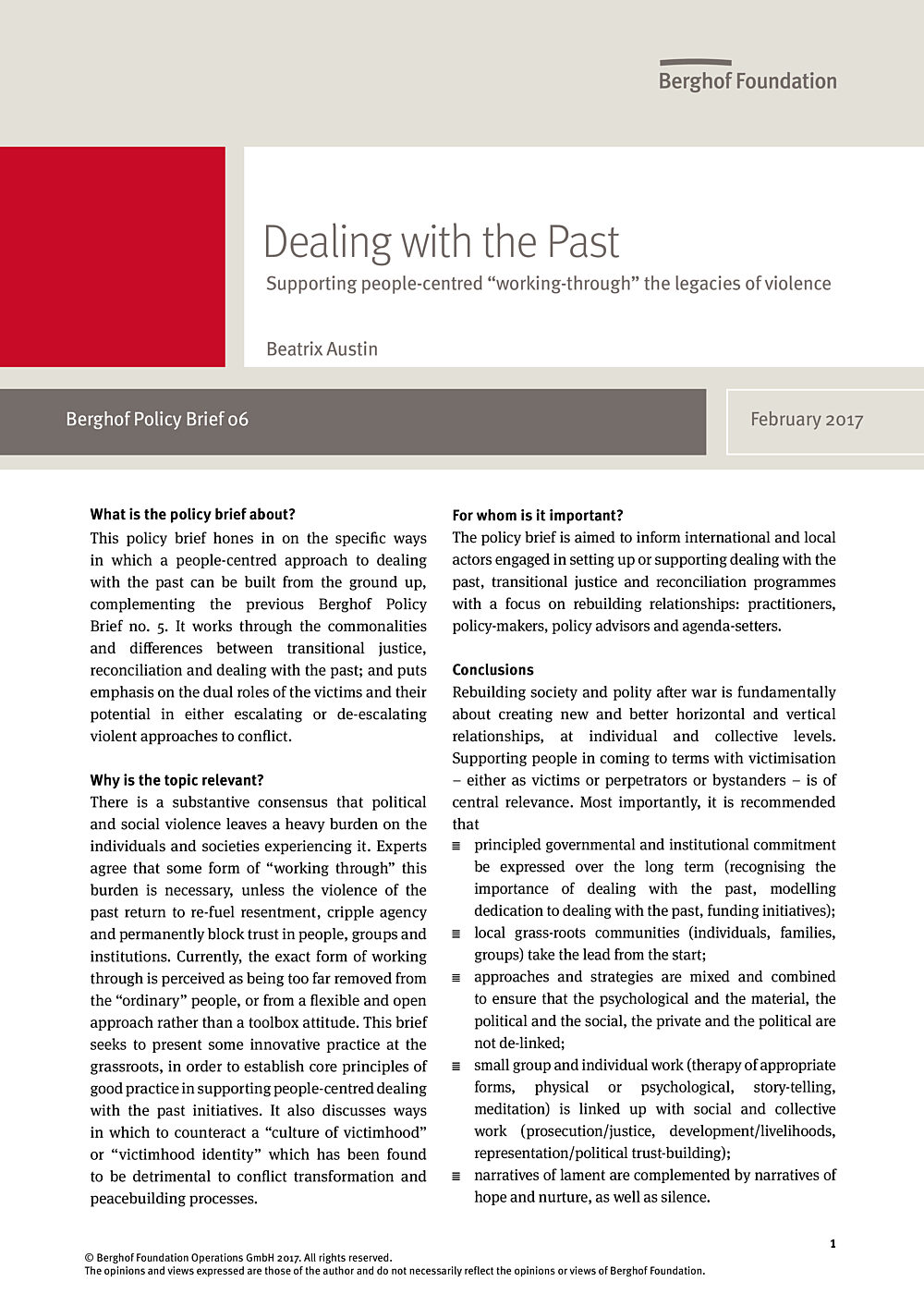
Dealing with the Past: Supporting people-centred “working-through” the legacies of violencePolicy Brief No. 6
This policy brief hones in on the specific ways in which a people-centred approach to dealing with the past can be built from the ground up, complementing the previous Berghof Policy Brief no. 5. It works through the commonalities and differences between transitional justice, reconciliation and dealing with the past; and puts emphasis on the dual roles of the victims and their potential in either escalating or de-escalating violent approaches to conflict.
- Year 2017
- Author(s) Beatrix Austin
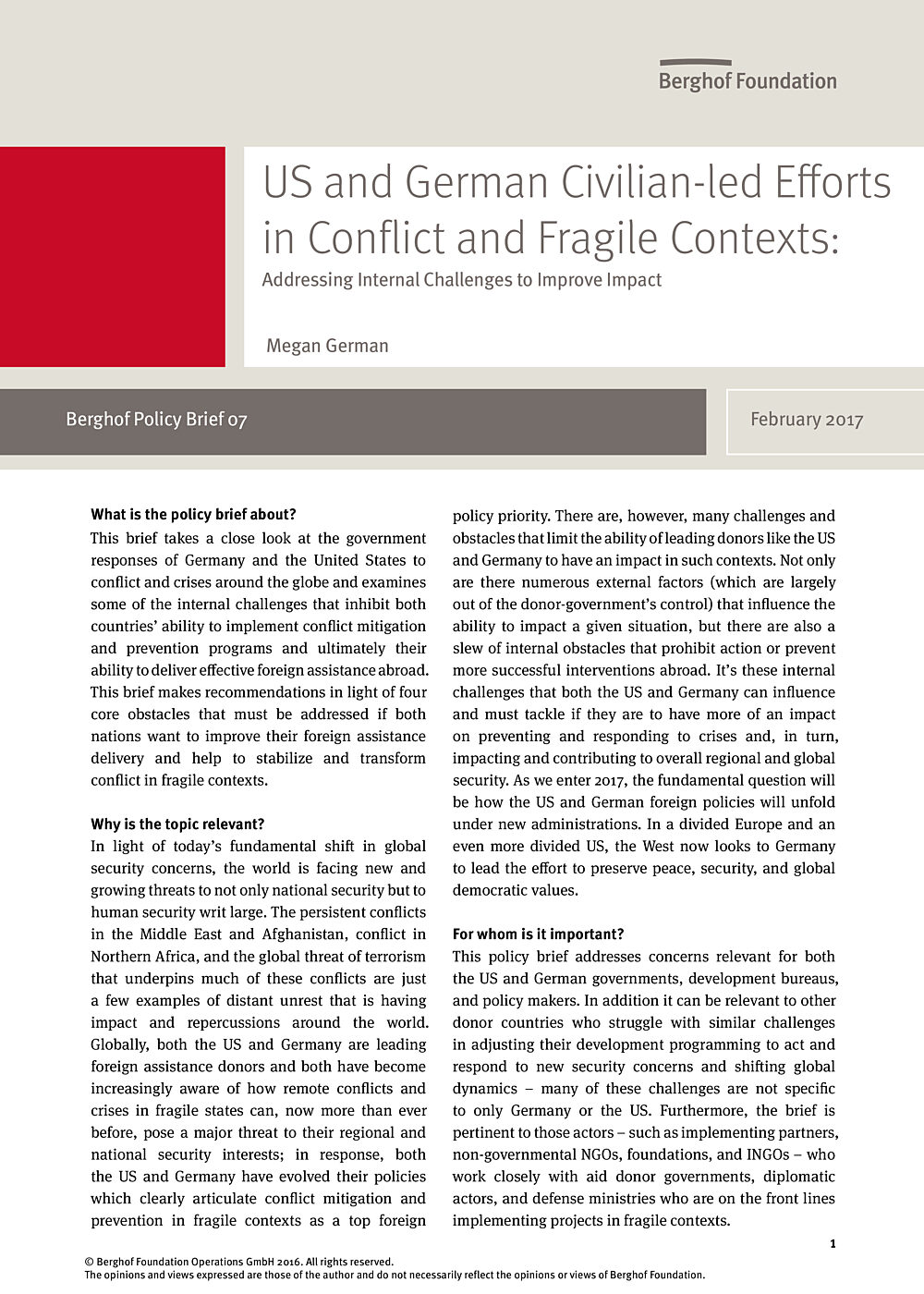
US and German Civilian-led Efforts in Conflict and Fragile Contexts: Addressing Internal Challenges to Improve ImpactPolicy Brief No. 7
This brief takes a close look at the government responses of Germany and the United States to conflict and crises around the globe and examines some of the internal challenges that inhibit both countries’ ability to implement conflict mitigation and prevention programs and ultimately their ability to deliver effective foreign assistance abroad. This brief makes recommendations in light of four core obstacles that must be addressed if both nations want to improve their foreign assistance delivery and help to stabilize and transform conflict in fragile contexts.
- Year 2017
- Author(s) Megan German
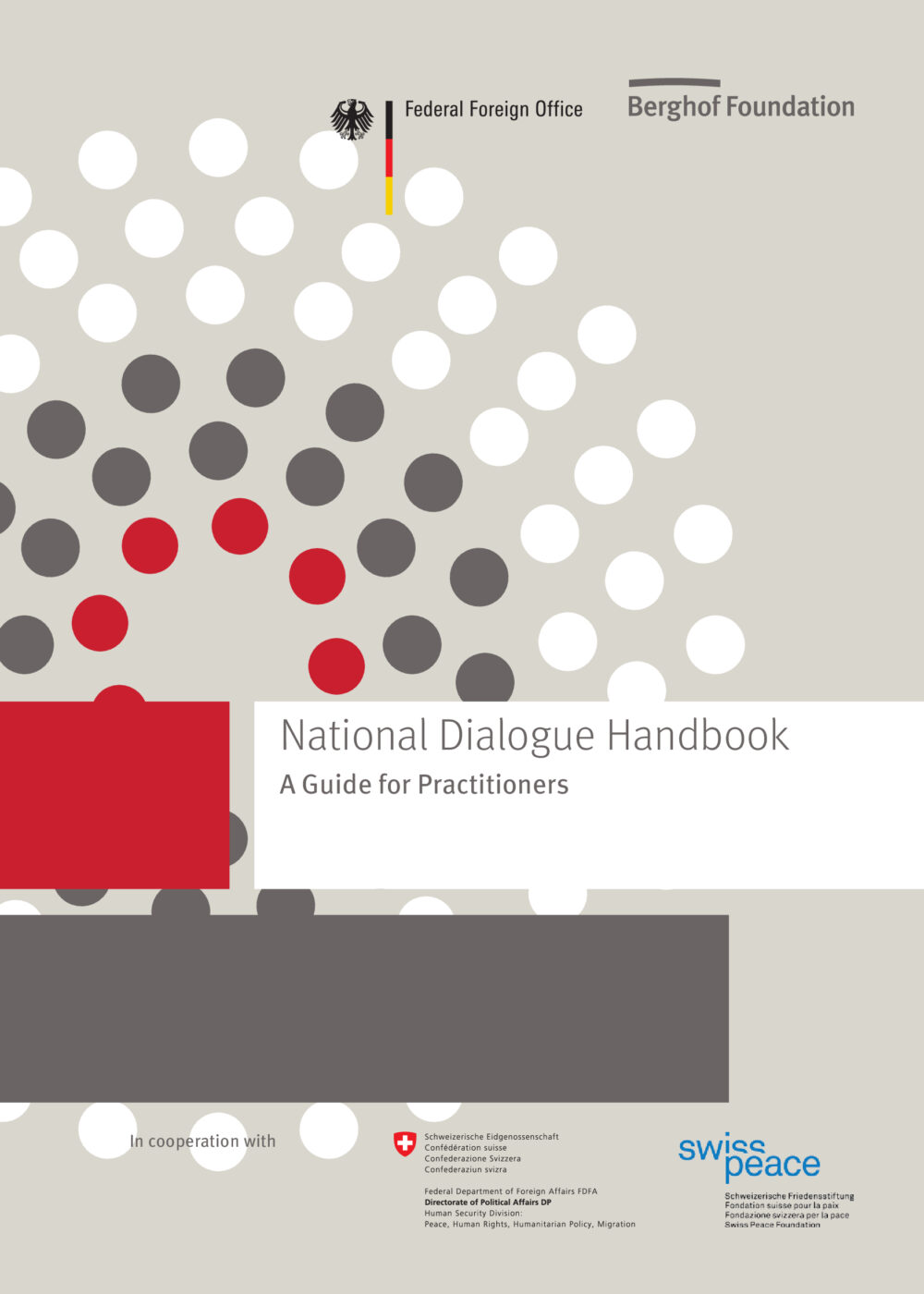
National Dialogue HandbookA Guide for Practitioners
Grounded in a series of contemporary case studies, this Handbook aims to contribute to the nascent debate about National Dialogue, bringing together insights and expertise from diverse regions. In doing so, it seeks to present systematic reflections and offer practical advice. The Handbook thus supports conflict stake-holders and practitioners (both local and international) to grapple with the challenges they face and to pursue the most appropriate design for their particular context. Moving beyond simplistic approaches, the Handbook also seeks to provide an overview of National Dialogue processes, drawing from the expertise and practices of scholars and practitioners.
- Year 2017
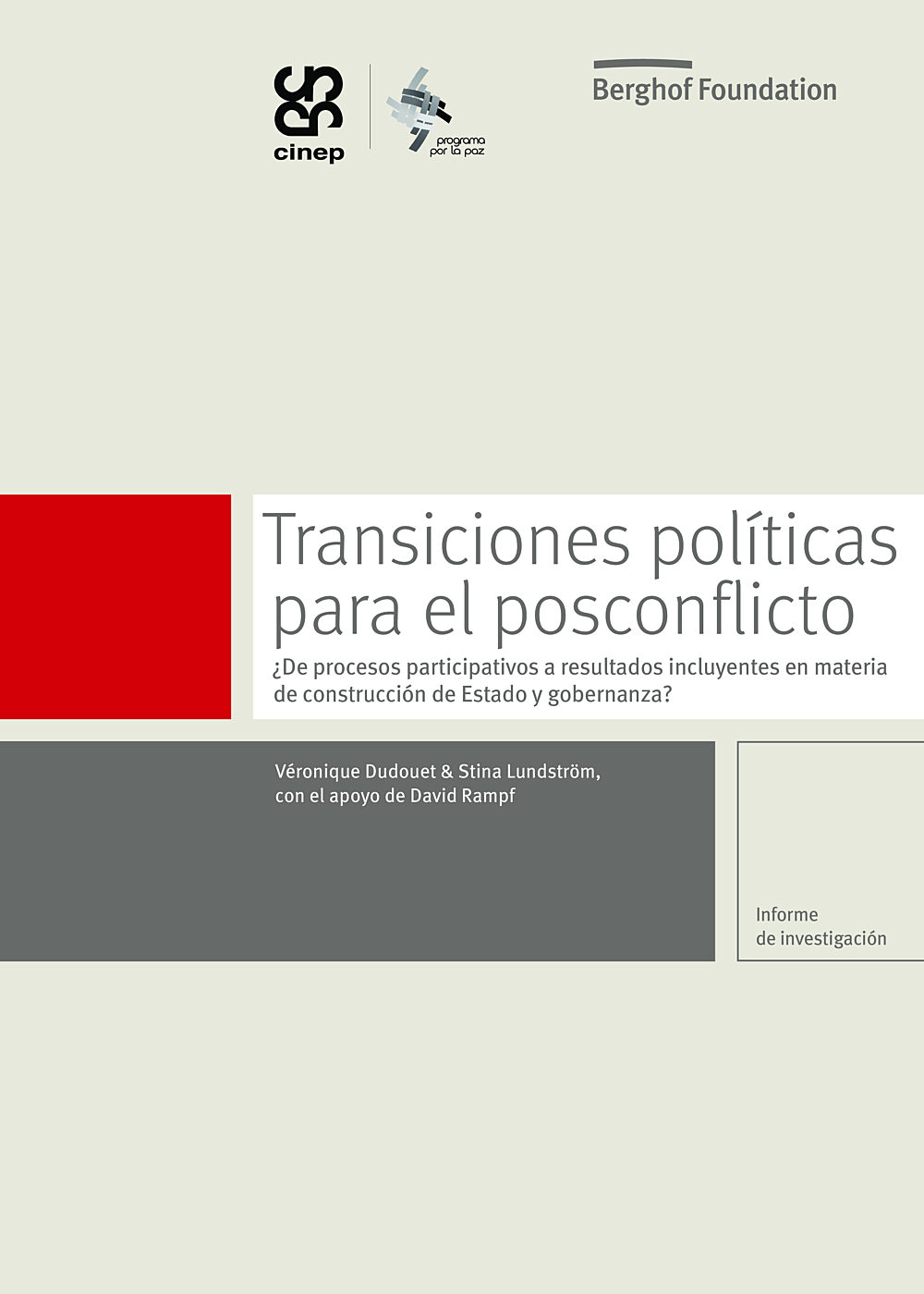
Transiciones políticas para el posconflicto¿De procesos participativos a resultados incluyentes en materia de construcción de Estado y gobernanza?
El presente informe de investigación se propone aportar a los debates académicos y de políticas sobre el tema, mediante la presentación de los resultados comparativos obtenidos de un proyecto de investigación colaborativa de 28 meses (febrero 2013-junio 2015) financiado por el Centro Internacional de Investigación para el Desarrollo (Canadá) y titulado “Cómo evitar la recaída en el conflicto mediante acuerdos políticos y construcción de Estado incluyentes tras conflictos intraestatales: oportunidades, enfoques y lecciones aprendidas”.
- Year 2017
- Author(s) Véronique Dudouet, Stina Lundström
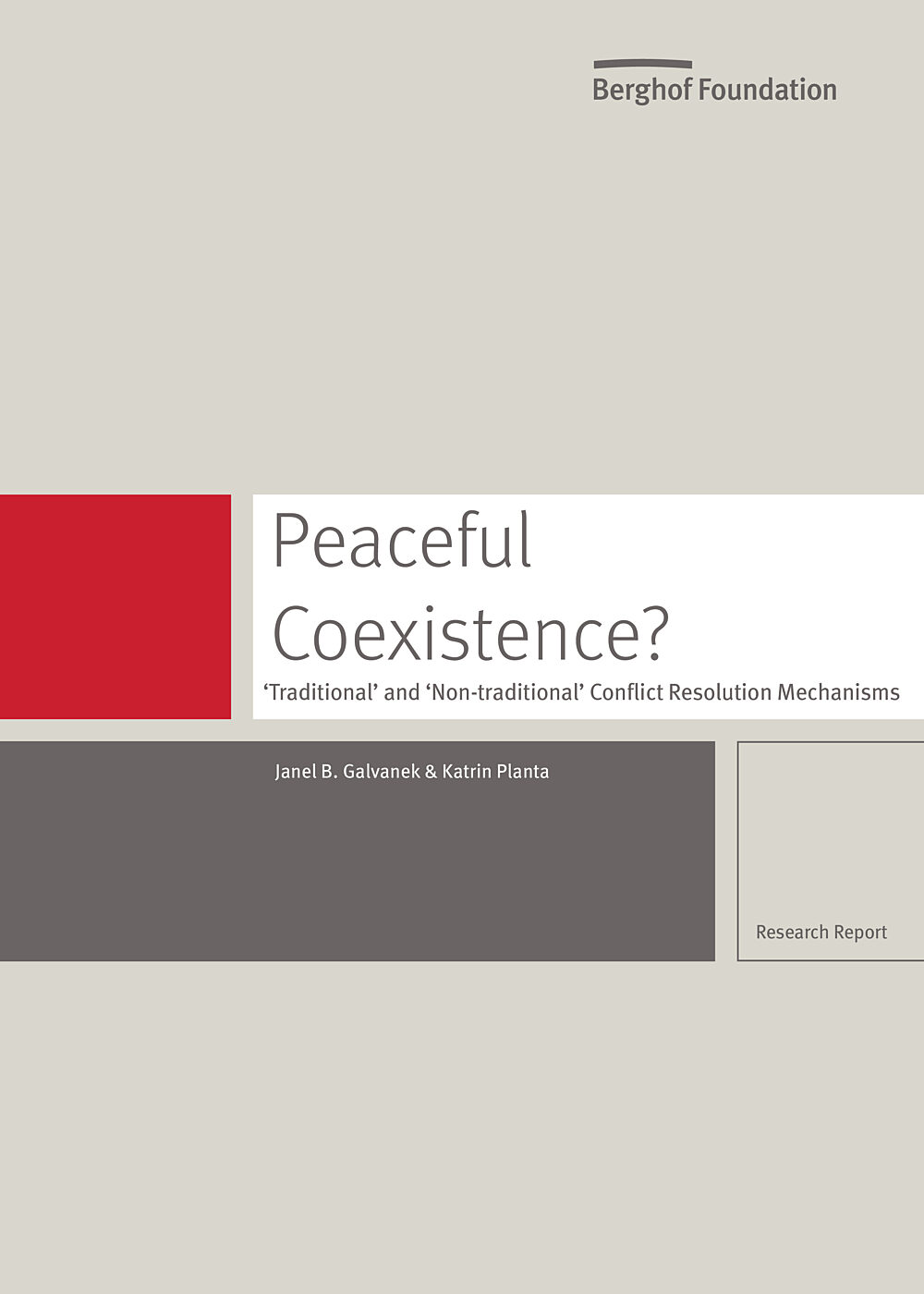
Peaceful Coexistence?‘Traditional’ and ‘Non-traditional’ Conflict Resolution Mechanisms
This report is the final analytical report of a comparative research project generously funded by the German Foundation for Peace Research and implemented by the Berghof Foundation. The project analyzes the forms of coexistence between ‘traditional’ (indigenous, local, community-based) and ‘non-traditional’ (imported, liberal, state-based, Western) approaches to conflict resolution, and is based on field research in Colombia, Liberia and Northeast India. Its central line of inquiry examines whether the coexistence of traditional and non-traditional mechanisms of conflict resolution leads to tension and competition between these mechanisms, thereby potentially furthering conflict, or whether the coexistence leads to more (or better) conflict resolution options for the population, thereby promoting conflict settlement processes and outcomes.
- Year 2017
- Author(s) Janel B. Galvanek, Katrin Planta
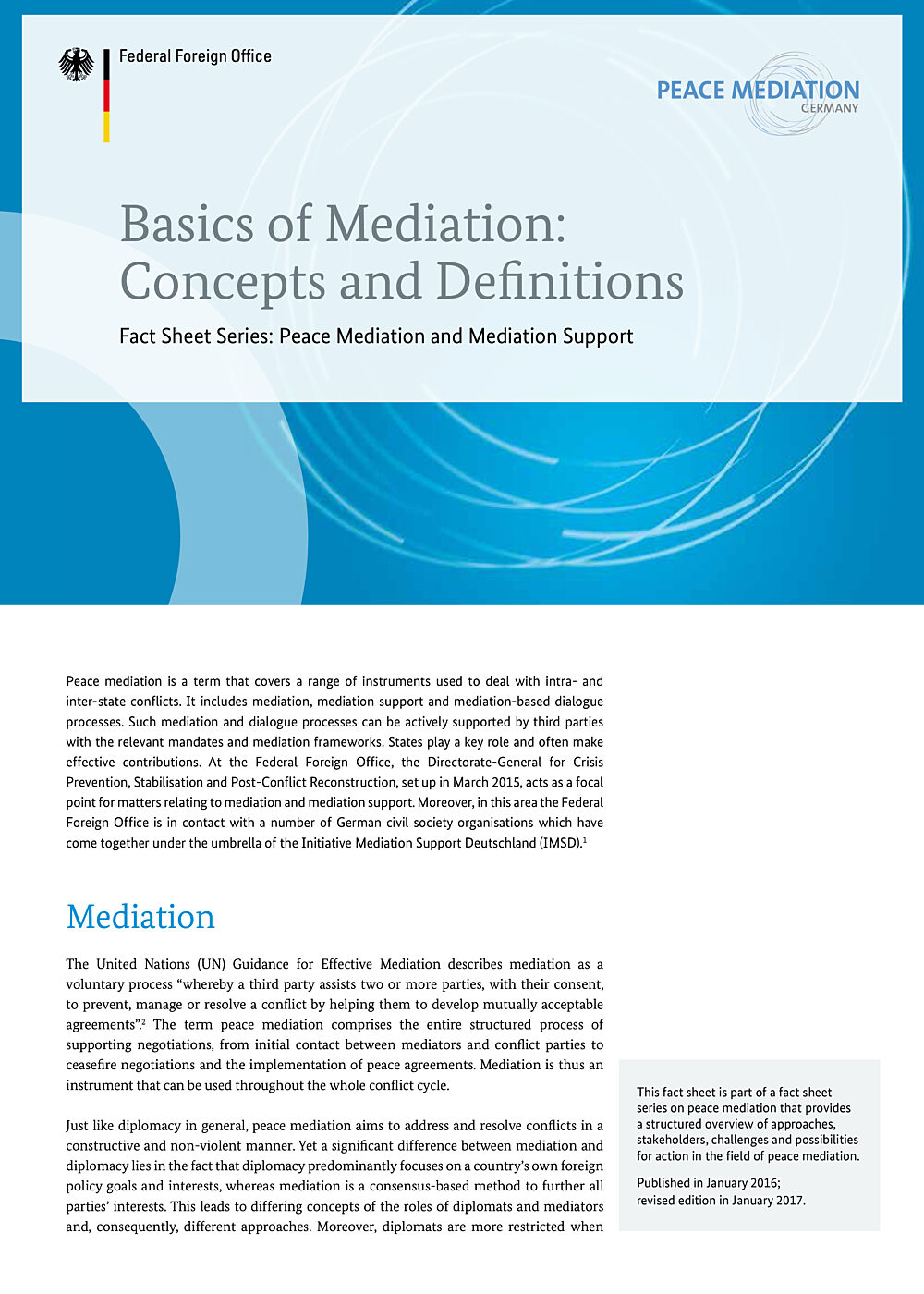
Basics of Mediation: Concepts and DefinitionsFact Sheet Series: Peace Mediation and Mediation Support
This fact sheet is part of a fact sheet series on peace mediation that provides a structured overview of approaches, stakeholders, challenges and possibilities for action in the field of peace mediation.
- Year 2017
- Author(s) German Federal Foreign Office, Initiative Mediation Support Deutschland (IMSD)
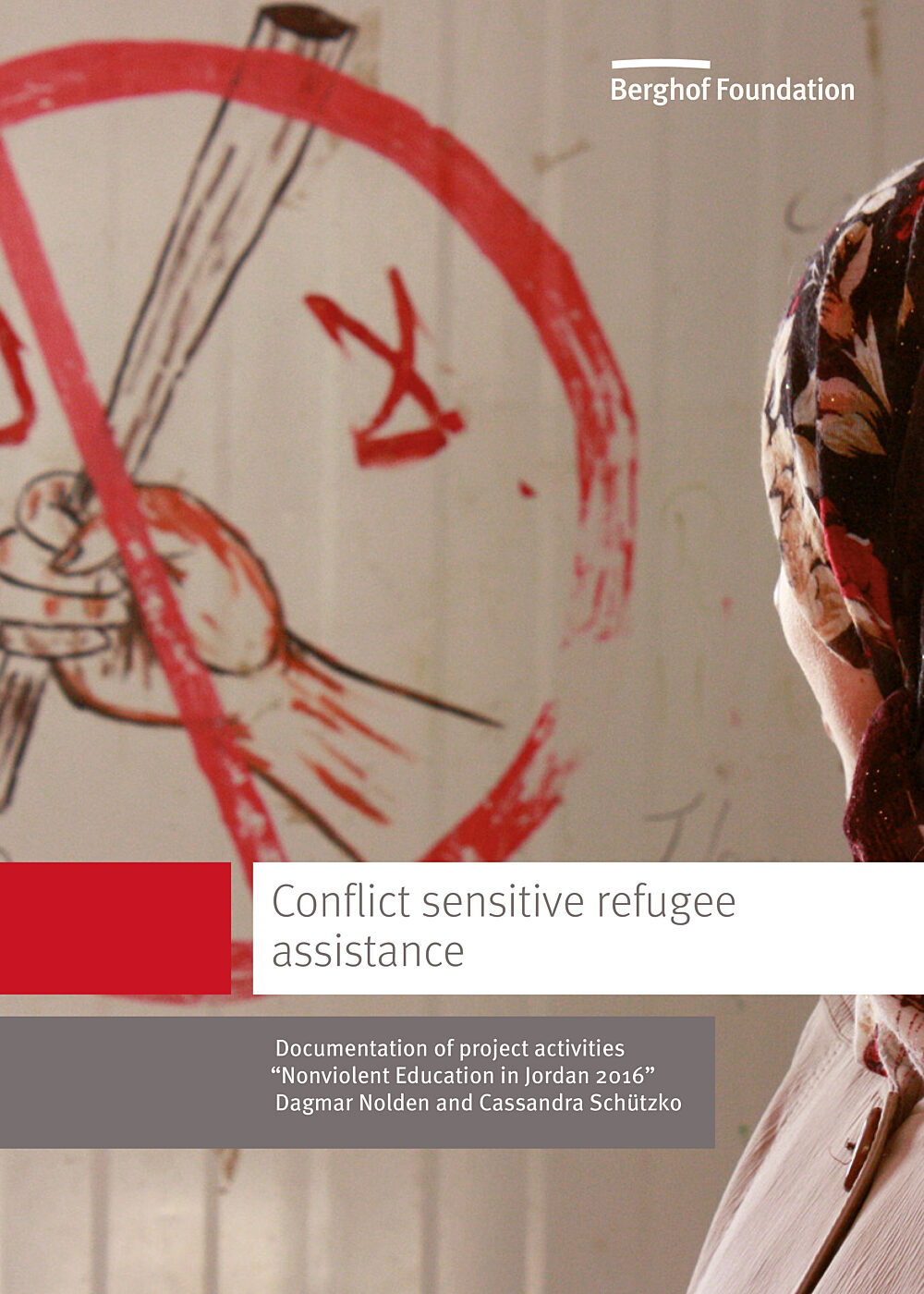
Conflict sensitive refugee assistanceDocumentation of project activities “Nonviolent Education in Jordan 2016”
Today, conflict sensitivity is a renown and established concept in the fields of education, development cooperation, and journalism. The concept is based on the assumption that every human action, well-intended or not, is a form of intervention in a certain context and, thus, interacts with it. In consequence, no action can be understood as neutral as they contain both, the potential to cause or intensify conflicts, but also the potential to promote and strengthen peace. Up to now, the concept has been mainly applied in professional contexts in former and current regions of crisis and conflict. The Berghof Foundation, however, perceives it as extremely valuable to apply it specifically to the field of professional and voluntary refugee assistance, where well-intended actions are often followed by misperceptions and frustrations that may culminate in the use of violence, instead of the envisioned outcome. The Berghof Foundation’s good experiences with a workshop format on conflict sensitive refugee assistance for volunteers engaged in the field in Germany and the affirmative feedback received by workshop participants, fed into the development of the two different formats of the model workshops on conflict sensitive refugee assistance in Jordan.
- Year 2016
- Author(s) Dagmar Nolden, Cassandra Schützko
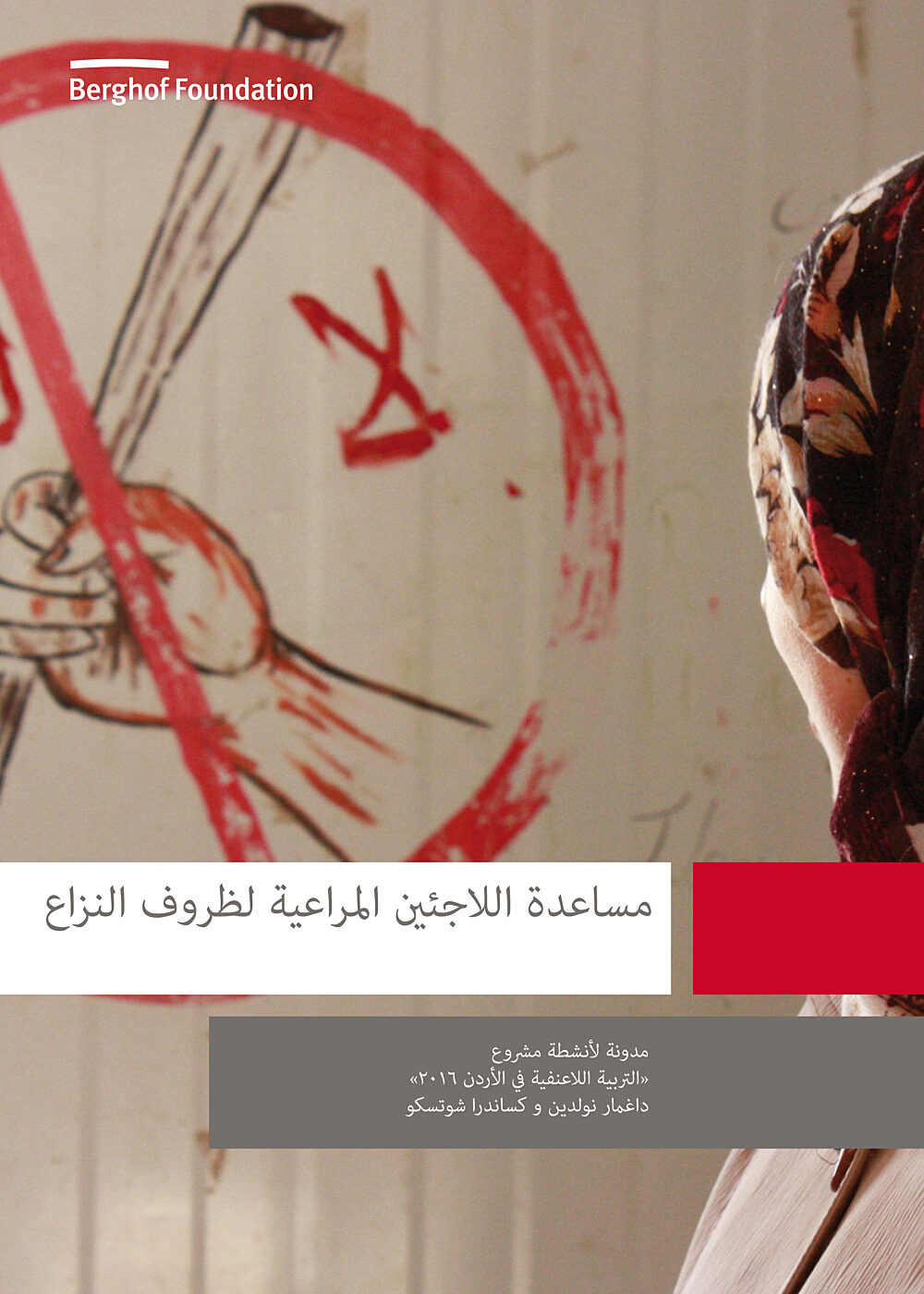
مساعدة الالجئني املراعية لظروف النزاعمدونة ألنشطة مرشوع
[خلاصة الترجمة الآلية]
تعتبر حساسية الصراع اليوم مفهومًا مشهورًا وراسخًا في مجالات التعليم والتعاون الإنمائي والصحافة. يعتمد المفهوم على افتراض أن كل عمل بشري ، حسن النية أم لا ، هو شكل من أشكال التدخل في سياق معين ، وبالتالي يتفاعل معه. ونتيجة لذلك ، لا يمكن فهم أي إجراء على أنه محايد لأنه يحتوي على كليهما ، إمكانية التسبب في النزاعات أو تفاقمها ، ولكن أيضًا القدرة على تعزيز السلام وتقويته. حتى الآن ، تم تطبيق المفهوم بشكل أساسي في السياقات المهنية في مناطق الأزمات والصراع السابقة والحالية. ومع ذلك ، ترى مؤسسة Berghof أنه من المفيد للغاية تطبيقه على وجه التحديد في مجال المساعدة المهنية والتطوعية للاجئين ، حيث غالبًا ما يتبع الإجراءات حسنة النية تصورات خاطئة وإحباطات قد تتوج باستخدام العنف ، بدلاً من المتصور. النتيجة. ساهمت التجارب الجيدة لمؤسسة Berghof Foundation في تنسيق ورشة عمل حول مساعدة اللاجئين الحساسة للنزاع للمتطوعين العاملين في الميدان في ألمانيا والتعليقات الإيجابية التي تلقاها المشاركون في ورشة العمل ، في تطوير شكلين مختلفين من ورش العمل النموذجية حول مساعدة اللاجئين الحساسة للنزاع في الأردن.
- Year 2016
- Author(s) Dagmar Nolden, Cassandra Schützko